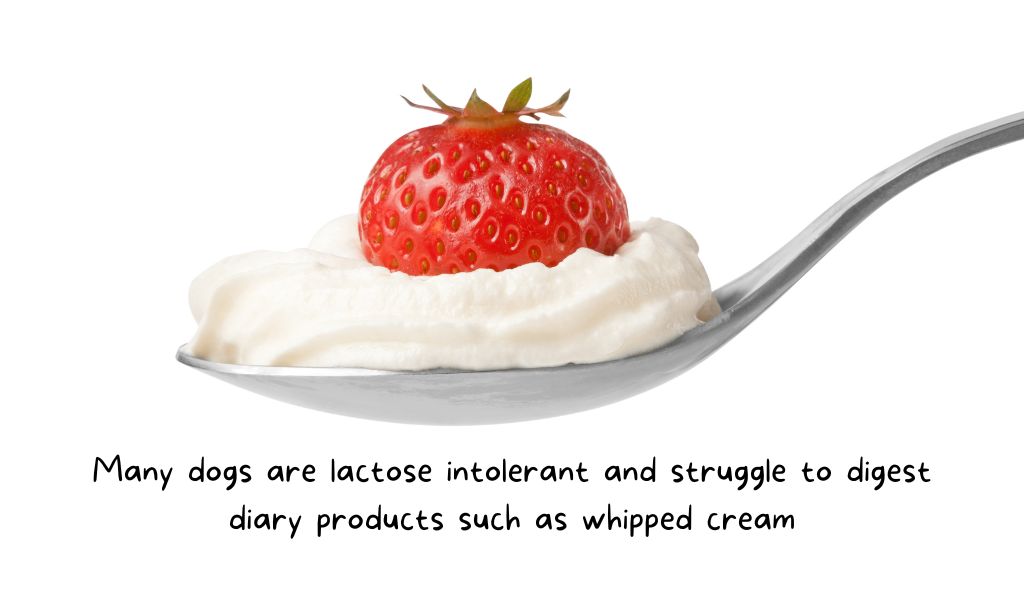Many of us enjoy a dollop of creamy goodness on top of our desserts and drinks, but when it comes to our four-legged friends, can a dog have whipped cream?
Let’s take a look at the safety risks and nutritional content of whipped cream so that you can make the best decision for your pup.
Whipped cream can be dangerous for dogs in large amounts due to its high fat content and added sugar. Furthermore, some brands of whipped cream contain artificial sweeteners such as xylitol which can be toxic to dogs. Therefore, it is best to avoid feeding whipped cream to your dog or consult with your vet before introducing it into their diet.
What’s in whipped cream?
Whipped cream is made of heavy cream, sugar, and sometimes flavouring agents like vanilla or almond extract.
The high fat content of whipped cream can cause digestive issues in certain breeds.
Additionally, many dogs are lactose intolerant, which means they cannot break down dairy products like whipped cream.
Since all dogs are different, try giving your pup a small sample to see how their body reacts.
If there are any adverse effects afterward—like stomach upset or diarrhea—it’s best to avoid whipped cream altogether.

Nutritional content
High fat foods like whipped cream can lead to pancreatitis in dogs if they eat too much.
While small amounts of whipped cream aren’t necessarily bad for your dog, it’s important to remember that it doesn’t provide any significant nutritional benefits either.
If you want to give your pet a special treat without compromising their health or diet, consider one of these healthier alternatives: peanut butter, applesauce, chicken broth or plain yogurt with no added sugar.
All of these options are safe for your dog and offer more nutritious benefits than sugary treats like ice cream or whipped cream.
Risks of feeding dogs whipped cream
Whipped cream is made from dairy products such as milk or heavy cream, which are not easily digestible by dogs. This can cause stomach upset and diarrhea.
Additionally, many commercial brands of whipped cream contain added sugar, which can be dangerous for dogs in large amounts.
Too much sugar can lead to weight gain and other health problems such as diabetes and heart disease.
• Whipped cream can be dangerous for dogs in large amounts due to its high fat content and added sugar.
• The high fat content of whipped cream can cause digestive issues in certain breeds. Additionally, many dogs are lactose intolerant, which means they cannot break down dairy products like whipped cream.
• If you want to give your pet a special treat without compromising their health or diet, consider one of these healthier alternatives: peanut butter, applesauce, chicken broth or plain yogurt with no added sugar.
Also, some brands of whipped cream use artificial sweeteners such as xylitol as a low-calorie alternative to regular sugar.
Xylitol is highly toxic to dogs and even small amounts can cause serious health problems including seizures and death.
Before feeding your dog any type of whipped cream product, make sure you check the ingredients list carefully for any potential dangers.
Finally, it’s important to note that dairy is actually one of the most common food allergens for dogs so it’s best avoided altogether if possible.
Even if your dog doesn’t have an allergy or intolerance to dairy products, they still don’t need them on a regular basis due to their high fat content and lack of nutritional value compared to other foods like meats and vegetables.
Final Words
When it comes to feeding your pup sweet treats like whipped cream, proceed with caution.
Because every dog is different and has unique dietary needs and sensitivities, always consult with your vet before introducing new foods into their diet—especially those that are high in sugar and fat like whipped cream.
While small amounts may not be harmful to some pooches, there are plenty of healthier alternatives out there that offer more nutritional value than sugary snacks like ice cream or whipped topping.
So opt for something else instead.




